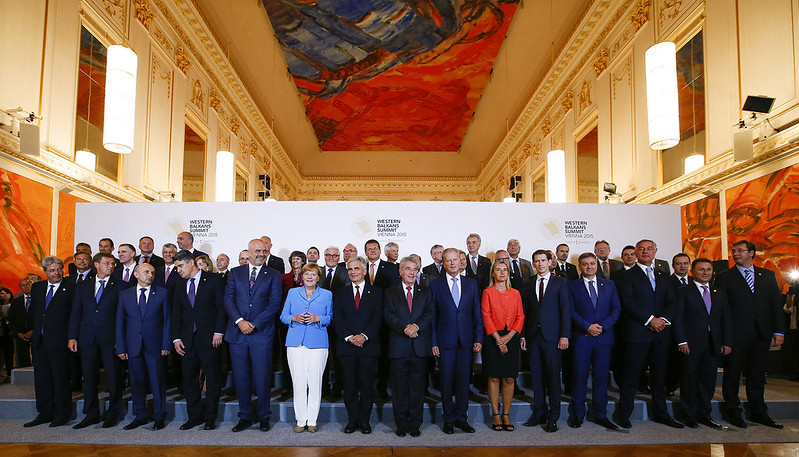By Bodo Weber
Following the September parliamentary elections in Germany, Chancellor Angela Merkel will leave office after a decade and a half during which she not only dominated the political stage in Germany and in Europe, but also took the lead role in the European Union’s enlargement policy towards the Western Balkans. Merkel was instrumental in keeping the countries’ membership prospect alive amidst rising “enlargement fatigue” within the European Union (EU), including in Germany and within her own Christian Democratic Union (CDU) party, and following the 2009 Eurozone crisis. During her time in office, she launched several initiatives, the most prominent among them the Kosovo-Serbia political dialogue (2012-2013) and the 2014 Berlin Process (still ongoing), aimed at fostering regional cooperation. Both ventures deviated from her cautious, reactive comfort zone. Over time, however, those achievements have come under increasing scrutiny, undermined by both major external developments and her own shortcomings.
The former includes three major international events of 2015-2016 – the European refugee crisis, the Brexit referendum and the victory of Donald Trump in the US presidential election – which reflected the growing crisis of the West and of the liberal world order. The latter refers to Merkel’s leadership style, best characterized as reactive and managerial and devoid of policy strategies or vision. Merkel’s leadership style increasingly set self-imposed limitations on her EU lead role which ultimately hit a wall during the refugee crisis. In the midst of the EU’s internal turmoil post-2015, the Union‘s policy towards the Western Balkans region in effect fostered instability, forcing Merkel and her government to shift into damage control and disaster prevention mode. They fought against then EU foreign policy chief Federica Mogherini’s support for a land swap deal in the Kosovo-Serbia dialogue that perverted the initial rationale and achievements of the political dialogue, and pushed back against French President Emmanuel Macron’s endangering of the enlargement prospect through his consistent blockage of the EU opening accession negotiations with North Macedonia and Albania. The impact of these developments left its mark on the Merkel era, leaving her almost empty-handed on her engagement on the Western Balkans. Her departure from the political stage demands a thorough evaluation of EU and German policies in the past decade and a half, providing an opportunity for a reset of German policy towards the region and of Germany‘s lead role on enlargement within the Union. There is broad consensus among analysts and policymakers in Berlin that the Greens, which according to recent polls stand a good chance of having a crucial role in the future German government, are best suited to fill the gap left behind by Merkel and to seize the opportunity in light of the upcoming change in the Chancellor’s Office.
Recommendations
This paper is written with a focus on a Kosovan audience. Thus, while the first set of recommendations is aimed at German policy for the entire Western Balkans region, the second is addressed specifically to Prishtina.
To the next German government
To avoid ultimate collapse of the EU’s enlargement policy and get its policy towards the Western Balkans back on track, the next German government coalition needs to take a number of crucial political steps early in its mandate, particularly in 2022:
- Berlin will need to address democratic backsliding in the Western Balkan countries by strengthening the rule of law and the fight against corruption in EU enlargement policy,
- Berlin should start an initiative within the European Council on a long-term EU policy strategy on Bosnia and Herzegovina, with constitutional changes at its heart,
- Berlin should seize the initiative and reach out early in 2022 to the Biden administration on drafting a new transatlantic Western Balkans strategy to include EU and NATO enlargement,
- Berlin needs to reach out early in 2022 to the Biden aministration on a joint initiative to reset Kosovo-Serbia negotiations to achieve a final, comprehensive agreement within a negotiating framework based on the original principles of the 2012-2013 political dialogue,
- Berlin needs to rally members to restore the credibility of the EU’s enlargement policy and membership prospect, and then revive the Berlin Process as a means to foster regional cooperation not limited only to infrastructure projects and retain German leadership in the process.
- Starting in early 2022, particularly following the French presidential election, Berlin will need to engage seriously with Paris on the future of enlargement, on unblocking accession negotiations with North Macedonia and Albania, and on visa liberalization for Kosovo citizens,
To the Kosovan government
In light of the forthcoming change in German leadership, the Kosovan government needs to prepare to advocate and engage effectively with the new German government to advance the interests of Kosovo and the wider Western Balkans region:
- Prishtina should reach out early to the new ruling coalition in Berlin to advocate for continuity in German EU leadership on enlargement policy towards the Western Balkans,
- Prishtina needs to ensure that its ongoing advocacy towards EU capitals to unblock visa liberalization for Kosovo citizens soon after the French presidential election is tailored to the specifics of the post-Merkel situation in Germany and the Union,
- Prishtina should advocate for the incoming Chancellor and government to take the initiative, together with President Biden and his administration, to reset negotiations on a final, comprehensive agreement with Serbia based on clearly defined principles and aims,
- Assuming a reset of negotiations, Prishtina needs to signal its readiness to compromise with Belgrade in return for Germany and the US guaranteeing that an agreement will lead to full sovereignty and territorial integrity for Kosovo and to substantial progress in achieving full international subjectivity based on the full cooperation and proactive support of Belgrade.

